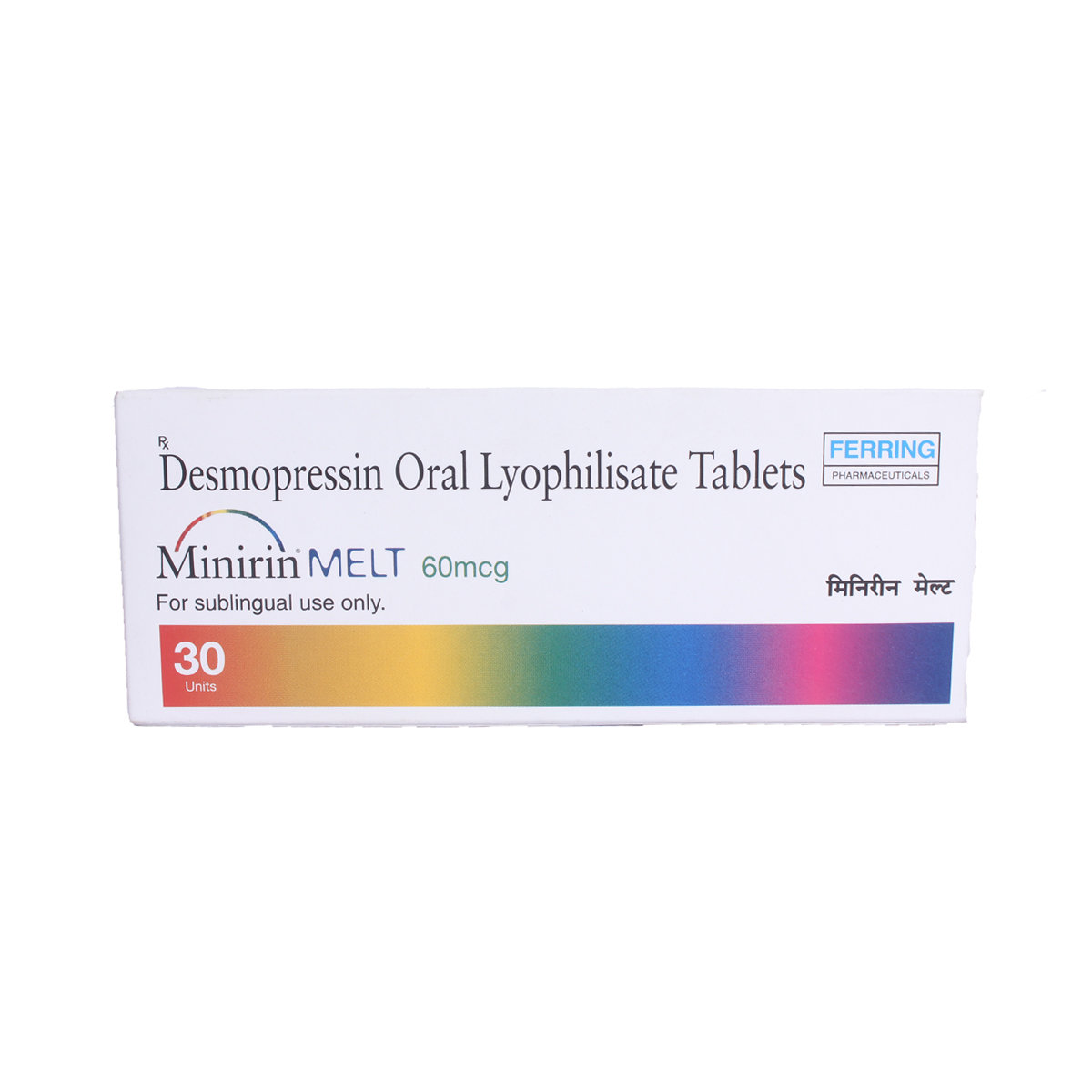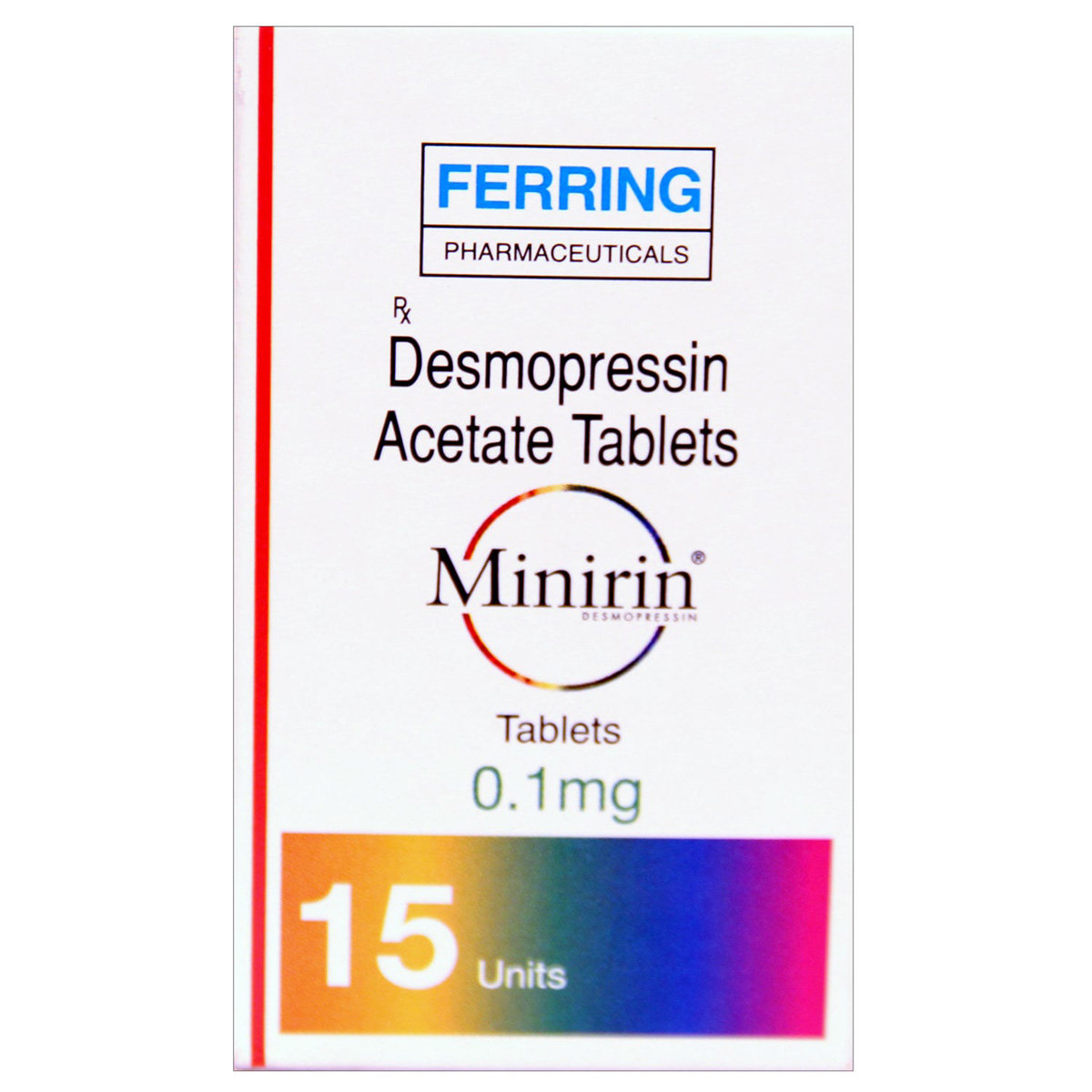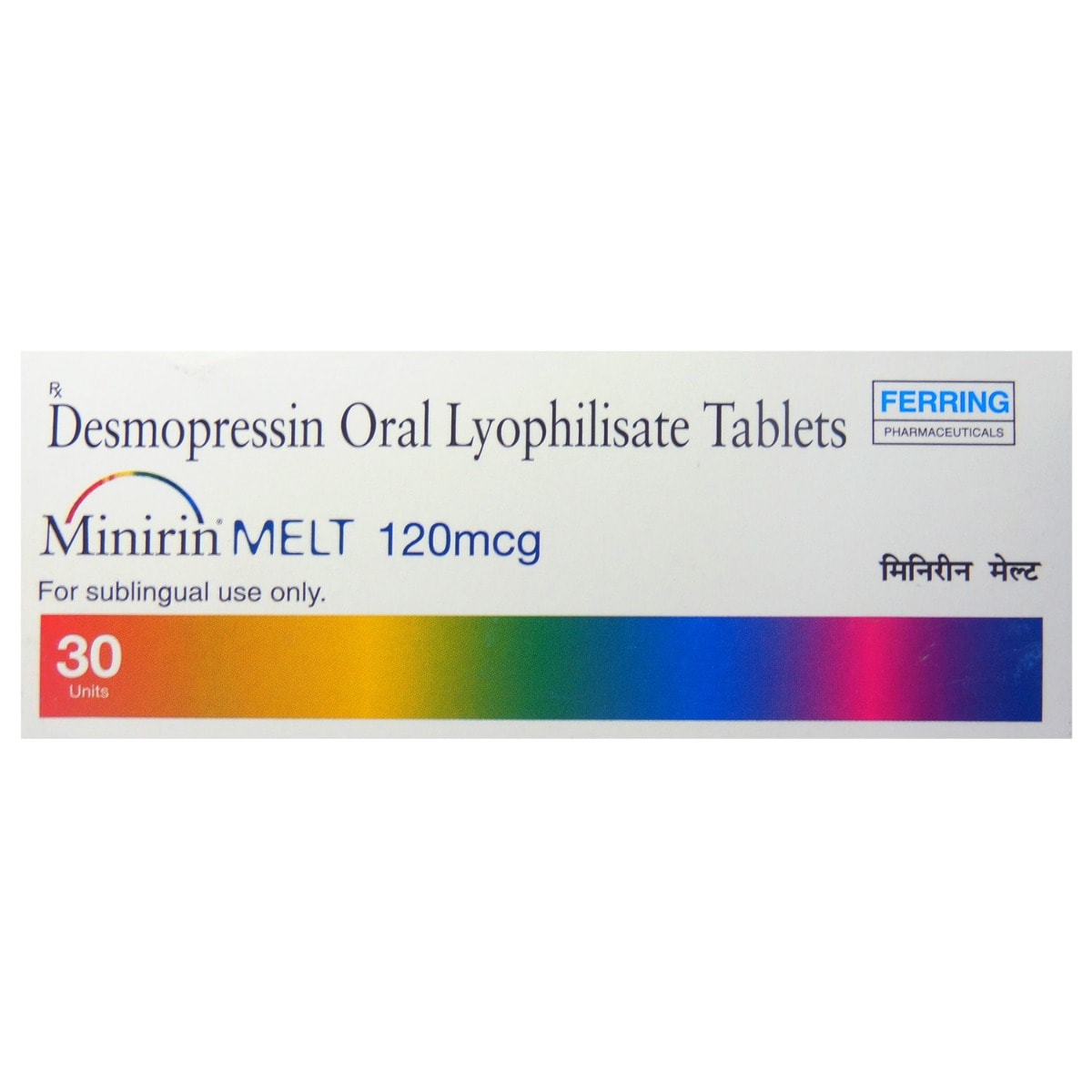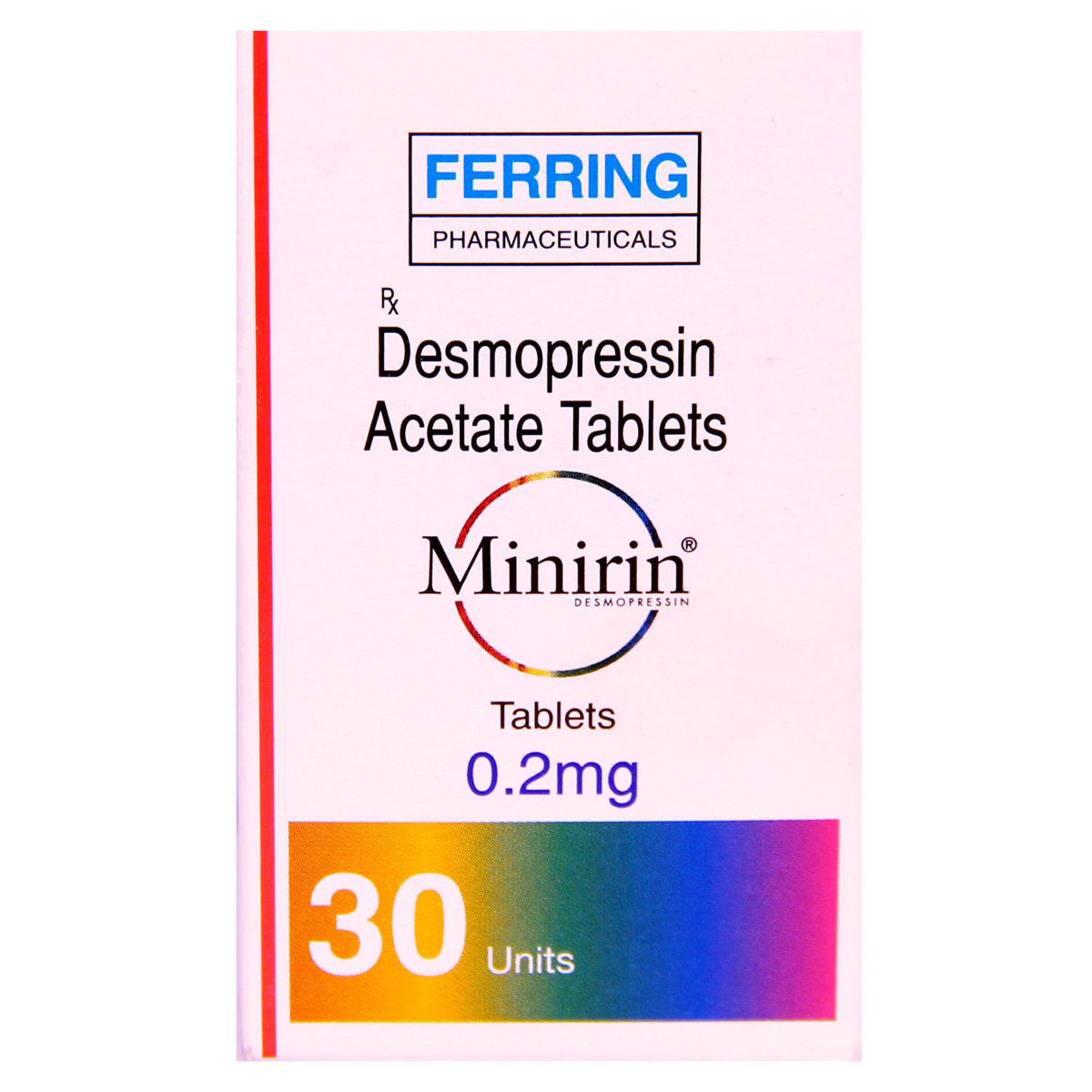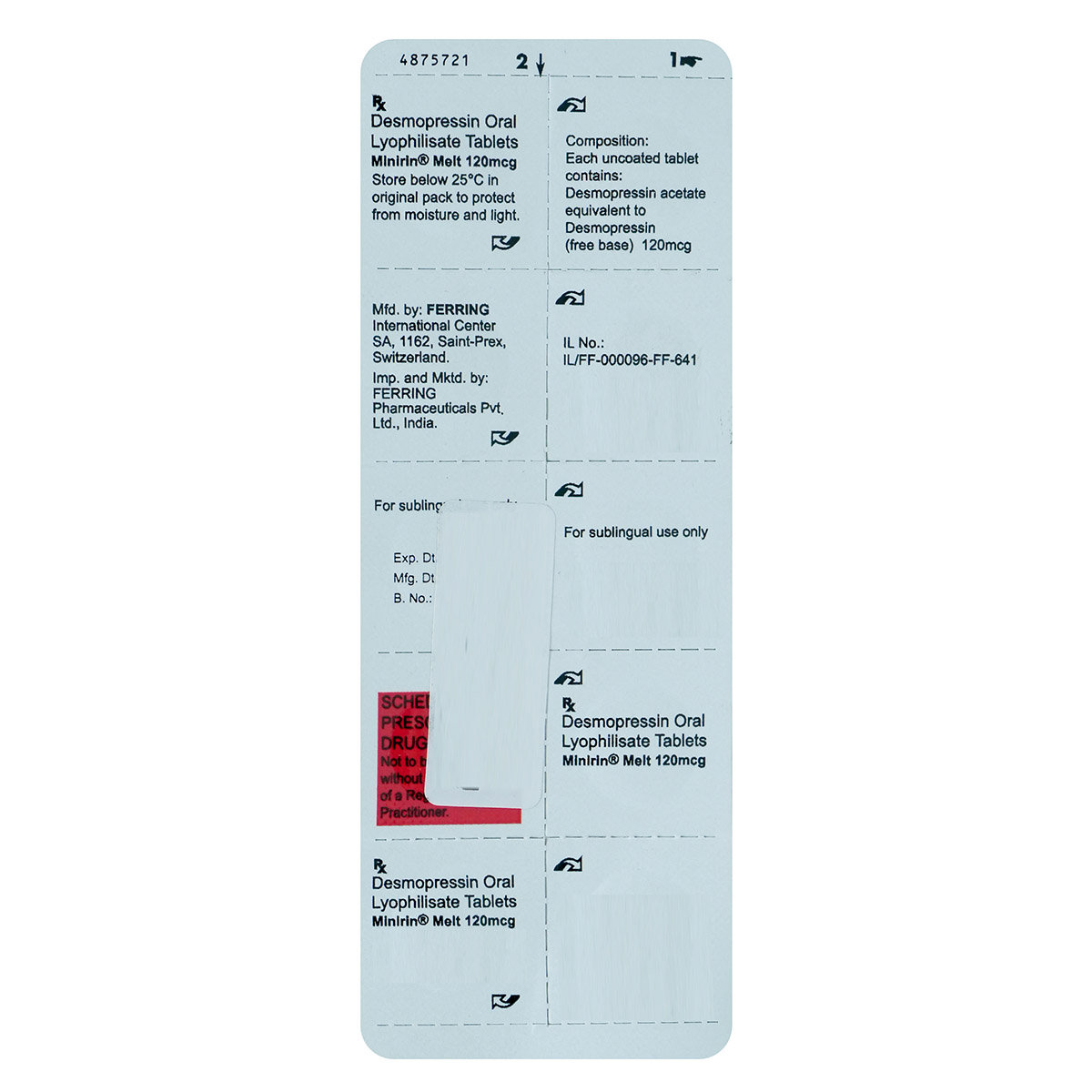Desmopressin
About Desmopressin
Desmopressin is used to treat diabetes insipidus, post-hypophysectomy polyuria (extreme urination), polydipsia (extreme thirst), and bedwetting. Diabetes insipidus is a condition in which the body fails to control water balance, resulting in excessive urination.
Desmopressin contains Desmopressin, which works by reabsorbing water from the kidneys and helps control excessive thirst and urination in diabetes insipidus. It also reduces the amount of urine produced and helps control bedwetting in children.
Desmopressin also reduces bleeding tendency in haemophilia (a bleeding disorder) by promoting the release of blood clotting factors.
Common side effects of Desmopressin include headache, nausea, abdominal cramps, and flushing (a sensation of warmth in the face, ears, neck, and trunk). Although not everyone experiences these side effects, if they occur, seek medical attention.
Let your doctor know if you have severe kidney disease, hyponatremia (low sodium levels in your body), extreme thirst, uncontrolled high blood pressure, heart failure, or fluid retention. Pregnant and breastfeeding women should consult their doctor before using Desmopressin.
Uses of Desmopressin
Medicinal Benefits
- Desmopressin is used to treat diabetes insipidus, a condition causing excessive urination and extreme thirst, by reducing water loss from the body.
- It helps manage post-hypophysectomy polyuria and polydipsia (excessive urination and thirst following pituitary surgery).
- The active ingredient, Desmopressin, is a synthetic analogue of vasopressin (antidiuretic hormone) that reduces urine production by the kidneys.
- By conserving body water, Desmopressin helps restore fluid balance and prevent dehydration.
- In children, it is used to control nocturnal enuresis (bedwetting) by decreasing nighttime urine production.
- As an anti-haemophilic agent, Desmopressin also helps reduce bleeding episodes by stimulating the release of clotting factors.
- Desmopressin provides effective control of excessive urination and thirst, prevents bedwetting, and aids in managing bleeding disorders.
Directions for Use
- Recommended to take the medicine before a meal to enhance its absorption.
- Follow your doctor's instructions on the dosage and timing of this medication, to ensure the safety.
- Swallow the medicine as a whole with glass of water.
- Do not crush, break, or chew it.
Storage
Side Effects of Desmopressin
- Headache
- Nausea
- Abdominal cramp
- Flushing (sense of warmth in the face, ears, neck and trunk)
Medicines Containing this Salt
View AllDrug Warnings
- Before starting Desmopressin, let your doctor know if you have any medical history of severe kidney disease, hyponatremia (low sodium levels in your body), extreme thirst, uncontrolled high blood pressure, heart failure, fluid/mineral imbalance (cystic fibrosis), bleeding/clotting problems, or fluid retention.
- While using Desmopressin, limit water and other fluids' intake since it may lead to electrolyte imbalance.
- Inform your doctor if you have any allergic reactions or lactose intolerance before using Desmopressin.
- Please consult your doctor before starting Desmopressin if you are pregnant, planning to conceive or are a breastfeeding mother.
- It is not recommended to consume alcohol since it may worsen the side effects and increase urination.
Drug Interactions
Drug-Drug Interaction: Desmopressin may interact with fits medicine (lamotrigine), antidepressants (escitalopram, fluoxetine, sertraline), and water pills (furosemide).
Drug-Food Interaction: Avoid alcohol since it may worsen the side effects and increase urination.
Drug-Disease Interaction: Tell your doctor before taking Desmopressin if you have a medical history of kidney disease, hyponatremia (low sodium levels in your body), severe thirst, uncontrolled high blood pressure, heart failure, fluid/mineral imbalance (cystic fibrosis), bleeding/clotting problems, and fluid retention.
Drug-Drug Interactions Checker List:
Safety Advice

Alcohol
unsafeIt is unsafe to consume alcohol since it may worsen the side effects and increase urination.

Pregnancy
cautionDesmopressin is a pregnancy category B drug. It can cause pre-eclampsia in pregnant women, leading to high blood pressure, oedema (swelling due to the build-up of fluid) and proteinuria (protein in the urine). Please consult your doctor before starting Desmopressin if you are pregnant or planning to conceive.

Breast Feeding
cautionDesmopressin is excreted into the breast milk when used by a breastfeeding mother. Please seek medical advice before you start Desmopressin if you are nursing.

Driving
cautionDo not drive or operate machinery if you experience any unmanageable side effects with Desmopressin.

Liver
cautionPlease let your doctor know if you have any history of liver diseases or hepatic impairment when you are prescribed Desmopressin.

Kidney
cautionDesmopressin is contraindicated in patients with moderate to severe renal impairment. Please let your doctor know if you have any history of kidney diseases when prescribed Desmopressin.

Children
safe if prescribedDesmopressin can be prescribed to children by the doctor, depending on the disease. The doctor decides the right dose for a child based on his/her age and weight.
Habit Forming
Diet & Lifestyle Advise
- Maintain a fibre-rich diet and include healthy carbohydrates from fruits, vegetables and whole grains.
- Eat at regular intervals.
- Avoid drinking coffee, tea, cola, energy drinks, or other caffeine sources before bedtime since it can lead to increased urination.
- Avoid activities that cause dehydration, such as excessive physical exercise or spending time in the heat.
Special Advise
- Regular monitoring of electrolytes is essential to rule out the chances of fluid imbalance.
- If you are frequently urinating, it is advised to consult your endocrinologist to check for any hormonal abnormalities.
- You may also be advised to undergo any CT or MRI scans to know the functioning of your pituitary gland.
- Kidney functioning tests may be advised by your doctor to monitor for any renal impairment.
Patients Concern
Disease/Condition Glossary
Diabetes insipidus: It is a condition in which the body fails to control fluid balance, resulting in excessive urination. It is caused by two conditions: Central diabetes insipidus is a condition in which your pituitary gland cannot produce enough vasopressin (an antidiuretic hormone that maintains fluid balance). Nephrogenic diabetes insipidus is a condition in which you make enough vasopressin, but your kidneys may not respond to it, which regulates fluid balance.
Hypophysectomy: It is the surgical removal of the hypophysis (pituitary gland) to treat cancerous or benign tumours.
Haemophilia: It is an inherited bleeding disorder in which the blood does not clot normally. Symptoms include large or deep bruises, joint pain and swelling, and blood in urine or stool.
FAQs
Desmopressin is used to treat diabetes insipidus, post-hypophysectomy polyuria (extreme urination), polydipsia (extreme thirst), and bedwetting.
Desmopressin contains Desmopressin, a human-made form of vasopressin (antidiuretic hormone). When your body cannot produce enough vasopressin, Desmopressin is used to replace it. It helps treat diabetes insipidus, post-hypophysectomy polyuria or polydipsia, and bedwetting by causing water reabsorption in the kidneys and reducing the amount of urine to be filled up in the bladder.
Desmopressin does not cause weight gain. But it may cause fluid overload as a side effect by reducing the amount of fluid to be urinated. This fluid overload can result in weight gain.
Desmopressin does not cure bedwetting, but it helps control bedwetting. It is usually prescribed at night to prevent frequent urination.
Take the missed dose as soon as possible. However, if it is time for the next dose, skip the missed dose and go back to your regular dosing schedule.
Optimal intake of fluids is recommended. However, avoid excess intake of water and other liquids like coffee, tea, cola, and energy drinks, which can lead to worsening of the electrolyte imbalance.
Before starting Desmopressin, let your doctor know if you have any medical history of severe kidney disease, hyponatremia (low sodium levels in your body), extreme thirst, uncontrolled high blood pressure, heart failure, fluid/mineral imbalance (cystic fibrosis), bleeding/clotting problems, or fluid retention. While using Desmopressin, limit water and other fluid intake since it may lead to an electrolyte imbalance. Tell your doctor about allergic reactions or lactose intolerance before using Desmopressin. Also, let your doctor know if you are pregnant, planning to conceive or are a breastfeeding mother. It is not recommended to consume alcohol since it may worsen the side effects and increase urination.
Your doctor will decide the duration of treatment depending on your medical condition and response to the treatment.
Desmopressin contains Desmopressin, a human-made form (synthetic) of Vasopressin. Vasopressin is an antidiuretic (that controls fluid balance) hormone.
Swallow it whole with water; do not crush, break, or chew it. Follow the dose and duration as directed by the physician.
It is unsafe to consume alcohol since it may worsen the side effects and increase urination.
Desmopressin can cause pre-eclampsia in pregnant women, leading to high blood pressure, oedema (swelling due to the build-up of fluid), and proteinuria (protein in the urine). When used by a breastfeeding mother, Desmopressin is excreted into the breast milk. So, caution should be exercised. Pregnant and breastfeeding women should not use Desmopressin unless prescribed by the doctor.
Desmopressin is contraindicated in patients with moderate to severe renal impairment. So, it is essential to inform your doctor about your condition. Your doctor will prescribe the medication only if the benefits outweigh the risks.
The common side effects of Desmopressin include headache, nausea, abdominal cramps, and flushing (sense of warmth in the face, ears, neck, and trunk). Although not everyone experiences these side effects, if they occur, seek medical attention.

